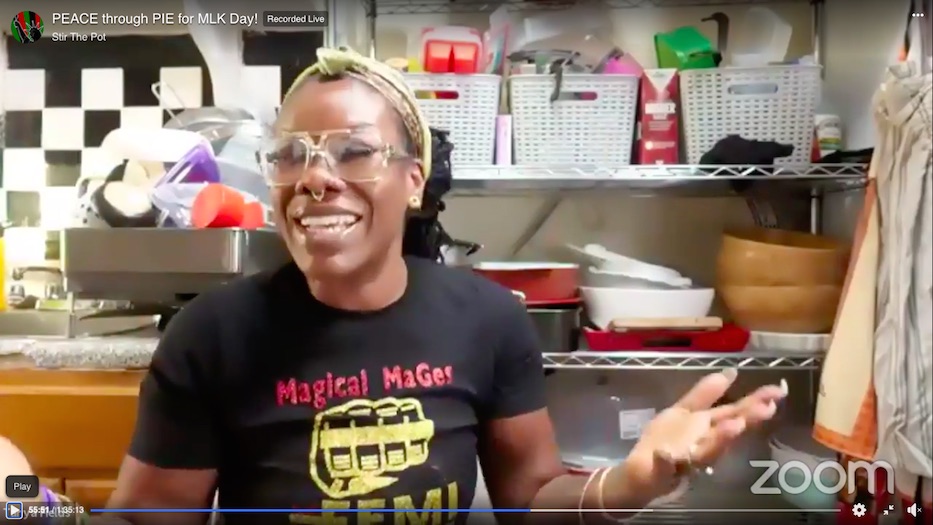
Food Justice | Stir The Pot | Arts & Culture | Nadine Nelson | Culinary Arts | COVID-19
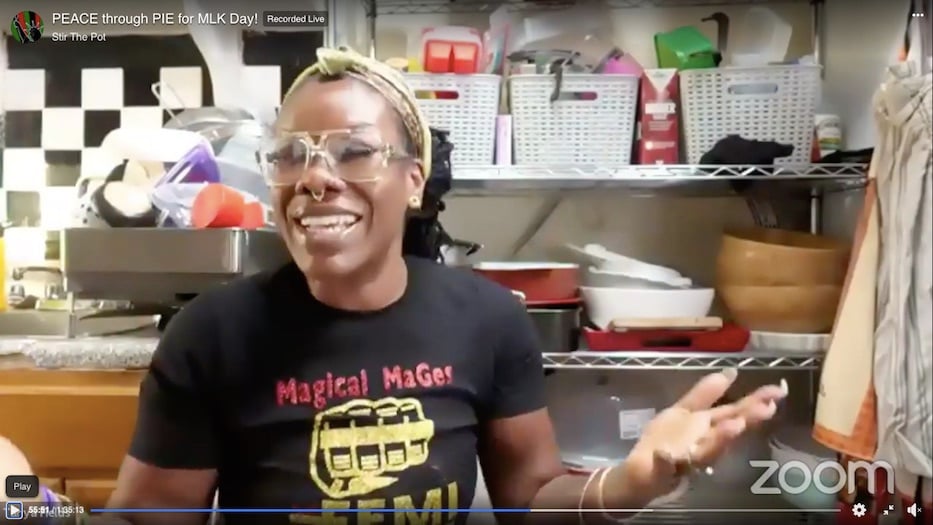
As Tanya Fields wove pastry strips into a neat latticework, she traced her family’s love affair with peaches from a Bronx kitchen back to the South. She slipped the dough into a cross-cross, and unspooled memories of her mother in Raleigh and Henderson, North Carolina. She brushed it with egg wash, and conjured her father’s folks in small-town Virginia. The golden glow of sugar-soaked peaches peeked out beneath her hands.
“Even now, it’s really hard,” she said. “We get peaches from local growers, and we love them. They don’t taste like a Georgia peach. It don’t taste like a peach from down South. There’s something about the soil.”
Fields—or as she is often known, Mama Tanya—brought her wisdom to a new pandemic-era Stir The Pot, reimagined and relaunched for online gathering. Last week, series founder Nadine Nelson ushered it in with “Power Of Pie,” a Martin Luther King day celebration of sweet and savory pie and culinary community on Zoom. In addition to Fields, the event featured chef Nancie McDermott and Peace Through Pie Executive Director Leslie Mattison.
“I wanted people not to get into their different silos and be all shy and everything, but just do what food does, which is create great fellowship,” Nelson said before the event. “Even though food might seem frivolous, hopefully it can get people to sit at the table and have discussions that bring us together.”
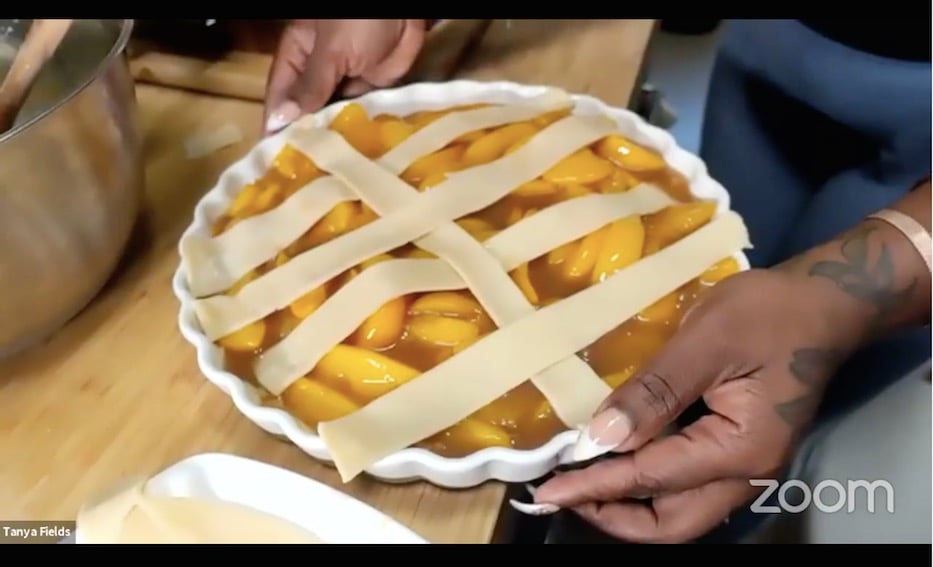
For the chef and founder of Global Local Gourmet, that itch to gather is a familiar one. Stir The Pot first started in 2018, under the umbrella of the New Haven Food Policy Council. In its first meetings at CitySeed New Haven and the Whitneyville Cultural Commons, it brought together master chefs, community elders, food justice advocates and curious cooks and eaters of all ages.
It was a potluck meets cooking class meets book club, punctuated by chapters from Julia Turshen’s Feed The Resistance. When the series ended temporarily in 2019, Nelson said she knew that she wanted to bring it back, but wasn’t sure how or when. Then last year, a grant from the Center for Artistic Activism allowed her to take the work virtual. Last Monday, she joined via Zoom surrounded by an array of pies, including savory options that she feels are too often sidelined for their sweet counterparts.
Fields and McDermott also joined from their kitchens, ready to fold culinary and personal history into their fruit pies. The series, like a good galette, is meant to be fun and unfussy: both chefs joked about butter, dispelled culinary myths, and encouraged home cooks to use shortcuts. The last, Fields noted, is intimately tied to food justice work itself—the idea of “slow food” is often embedded in a language of privilege and luxury. Saving time in the kitchen shouldn’t be a source of shame or embarrassment, she said.
“This idea that poor people don’t work as hard is BS,” she said. “Poor people work probably much harder than everybody else, for less of the gains. And so when we think about how that’s reflected in the kitchen, and we’re putting this pressure on people in the food justice spaces, in the slow food spaces, that we’re all going to be in the kitchen doing 45 minutes of prep, making an hour and a half long meal for folks who may not work a 9 to 5 … we have to think about ways that we can work in this kitchen, and create meals in this kitchen, that are gourmet-inspired and rooted, but also like ‘let’s get to it.’”
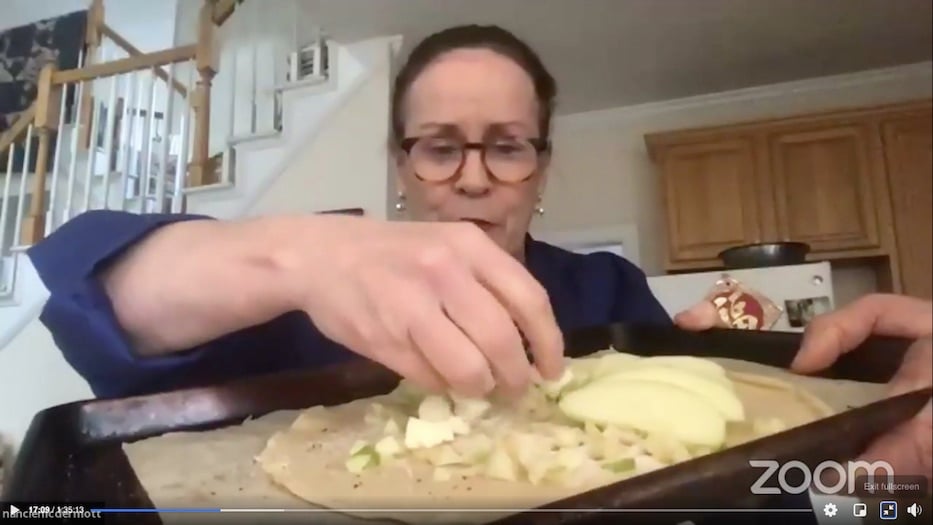
Both women practice what they preach. As she diced apples into small white pieces and larger slices, McDermott praised pre-made pie crust, as if to confirm that chefs plagued by squares of cold butter, ice-water baths and flour-covered countertops needn’t suffer in silence any longer. Later in the event, Fields echoed McDermott’s no-nonsense decision as she pulled a large can of peaches into the frame, put the label up close to the camera, and kept walking through the recipe.
Monday, Nelson also kept food justice at the core of the event. In under two hours, she drew a through line from Peace Through Pie founder Luanne Stovall back to Georgia Gilmore, who fed and funded the Montgomery Bus Boycott when she founded the Club From Nowhere. In the weeks leading up to the event, she published the recipe for a Civil Rights Sweet Potato Pie, where the deep warmth of allspice rises up to kiss cinnamon, condensed milk, and sweet potato.
That’s also been true for McDermott and Fields, who live in Chapel Hill and the Bronx, respectively. For the past 10 months, McDermott said, her travel schedule has ground to a halt. She’s been forced to slow down and use the tools available at home to share her cooking with the wider culinary community. Initially, she held daily cooking demos online, using Facebook Live. She also read books aloud, in an attempt to create content for readers who might be out of school.
Then after the state-sanctioned murder of George Floyd in May, she added near-daily anti-racism check ins to her rotation. She suggested that her kitchen could be a starting place for discussion and debate.
“There’s a saying that if you keep doing what you’ve always done, you’ll get what you’ve always gotten, and we’ve got to do this differently,” she said. “We’ve got to change into a world where John Legend doesn’t have to say, in a few words, ‘just stop killing us.’”
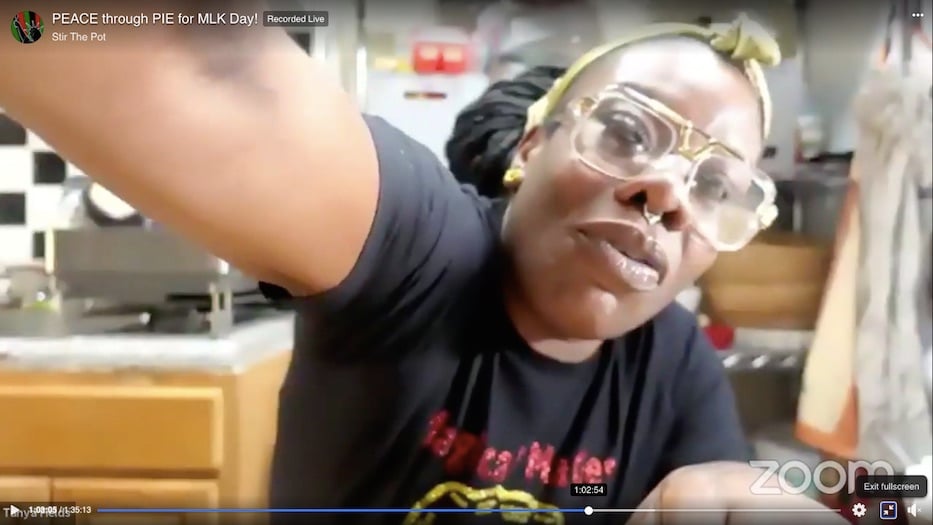
Fields joined wearing a t-shirt for the Black Feminist Project, the food justice, womxn- and MaGe-centered nonprofit that she founded in the Bronx. She is currently raising funds for the Alice Fields Community Center, named to honor her grandmother’s life and work. The matriarch of her family lived a life of activism, from mothering seven children to fighting against gentrification and for education on the Upper West Side of New York.
She “was going to be unapologetically and fiercely who she wanted and needed to be,” Fields said. She now carries that legacy in her own work.
From her kitchen, she traced her own journey to food justice work, which started when she was a 10-year-old girl and has blossomed into an urban farm, food bus outfitted with solar panels, and the beloved culinary chronicle Mama Tanya’s Kitchen. Years ago, she explained, she began thinking about how to improve her own quality of life and that of her family and community in a capitalist world that was not interested in seeing her succeed. Fields explained that she does not simply see food justice as a matter of survival—she wants to see her community thrive.
“I did not get into this work through some altruistic means,” she said. “I did this work because I was a 22-year-old, single, Black, struggling mother who moved to one of the poorest Congressional districts in the country, and got here, and quickly got acquainted with what systemic oppression looks like. So when I do this work, around food justice, I lean a lot more into the systemic issues … I’m like a more equitable, more fabulous Joe Jackson.”
She doesn’t do it alone, she added. Her production team comprises her six kids, her boyfriend, and, occasionally, a cat that does not like to follow directions. Each time she smiled, her nose ring glinted in the light. As she spoke, she urged attendees to consider the origins of food and eating in what is now recognized as the U.S., and how they’ve been co-opted by white supremacy.
She traveled back in time, unspooling the history of Indigenous and enslaved people who taught white colonialist-settlers what and how to eat. Now, that history has been commodified and manipulated, she said. She advocated for giving Black people space, credit, and fair compensation where they can share the work that they’ve been doing for centuries.
In between, she shared personal stories that made her feel like a best friend, including her tradition of bringing back a suitcase of Georgia peaches each time she visits Atlanta. It was as if the audience had gathered for a meal, pandemic style.
“I love Ree Drummond and the Pioneer Woman and Homestead, but me and Therese [Nelson] and Nadine’s folks—we’ve been doing that!” she said before taking out a white tart pan for her peach pie. “Because if you didn’t do that, you didn’t eat! … We brought those types of techniques here. It feels extremely unfair that there’s a whole lifestyle genre that is built on the pathways and history of the work that we’ve done here around food and making sure that we didn’t starve, and making sure that white folks ain’t starve.”
That truth-telling is part of the project's mission, Nelson said. With grant funding, the series will remain online for the foreseeable future, as Covid-19 makes gathering in person impossible. Stir The Pot’s next event—a President’s Day “unconference”—is scheduled for next month.
Creating Through Covid-19
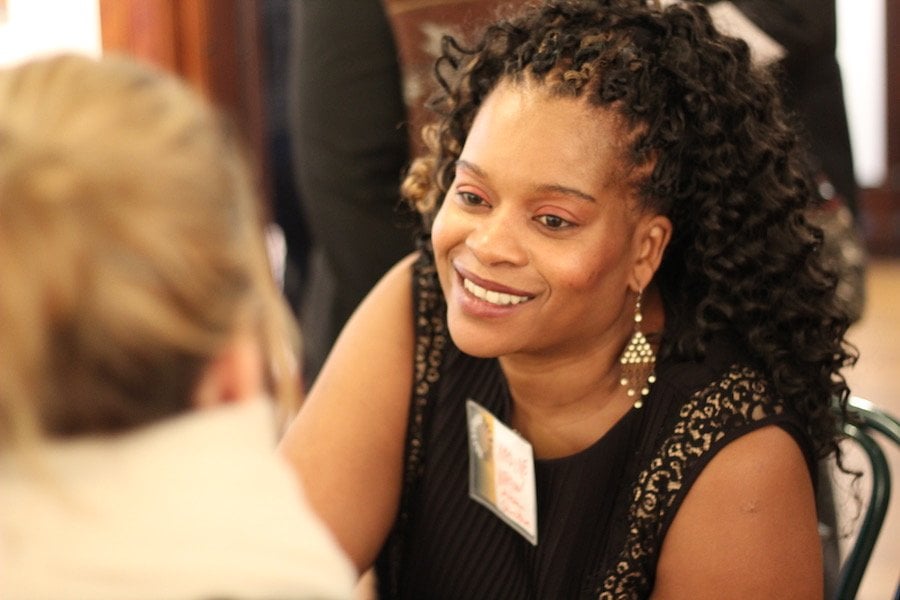
Nadine Nelson at the Ely Center for Contemporary Art in 2019. Lucy Gellman pre-pandemic file photo.
The series comes as Nelson also works as the newest Creative-In-Residence at the New Haven Free Public Library. In the position, she has been holding weekly office hours, putting together some of the library’s weekly “Take and Make” activity kits, and holding discussions with local creatives including artists Amira Brown, Cynthia Beth Rubin, Lee Lee McKnight and others. She has planned a chocolate making demo in time for Valentine’s Day, working beside Entrepreneur-In-Residence Marina Marmolejo to make molds.
In some ways, that role is decades in the making. Nelson is a lifelong tinkerer and bookworm, whose soft spot for local libraries rivals her love for a good apple pie with vanilla ice cream. Originally, Nelson moved to New Haven from Toronto at 10 years old. Her mom sent her to St. Aedan School, a Catholic School that still stands on the corner of Alden and McKinley Avenues in the city’s Westville neighborhood. Each day after school, she and her cousin walked over to the Mitchell Branch Library to hang out with their favorite librarian, a certain Ms. Isaacs that Nelson still thinks about.
When Nelson and her cousin finished work, the librarian gave them 25 cents each for brownies at a nearby, now-defunct bakery. Nelson never forgot her kindness.
“It’s great that I get to give back and be part of a New Haven institution that I really believe in,” she said. “Being that I moved to New Haven when I was 10, it was kind of rough in the 80, And so, it was a really safe place to be, it was a refuge, and it was a place to feed my curiosity.”
When she moved back to New Haven 10 years ago, she reconnected with the library immediately. Her daughter Soleil was two years old, and loved programming at the Stetson and Mitchell Branches. Nelson made weekly pilgrimages to pick up books and ended up teaching food justice and nutrition classes. The longer she stayed, the more the library became a part of her life—and she a part of its.
Originally, being the Creative-In-Residence wasn’t on her radar. Last year, Nelson had just finished curating an exhibition on the Yoruba goddess Oshun when coronavirus forced a wave of shutdowns across the state. She had planned to spend the year relaunching the catering side of her business, Global Local Gourmet. When that became impossible, she pivoted to the position at the library. She said she is mining it for collaborative projects with EcoWorks, MakeHaven, and others.
“I wanted to make sure that I carved out time to make sure that I did art, and that I took this opportunity to not only do programs, but to deepen my practice and allow me to do my practice,” she said. “It allows me to work on whatever I’m working on. It allows them to see another creative or artist work on what they’re working on. And then see a variety of processes.”
She added that she sees the position as an opening to talk about self-care, particularly among women. Last March, over 11 million women lost their jobs. It was the beginning of a wave of women leaving the American workforce—often not by choice—that has continued into 2021. Within that number, Black women and other women of color have been disproportionately affected.
In a recent take-and-make demo with the library, she showed attendees how to make spa kits at home with objects they could find in their kitchens. She has dedicated her discussion series largely to women, in an effort to highlight work that is often overlooked in the community. She said that she’s pushing back against a fog of collective depression and malaise that she can feel the entire community—and the country—fighting with her.
“A lot of people feel like ‘oh, I have to have this or that, or do this or that’ to be creative,” she said. “I want to show that there’s all different ways to be creative and get windows into people’s lives.”
Find out more about Stir The Pot here. Register for Stir The Pot’s next event, a President’s Day Unconference, here.

